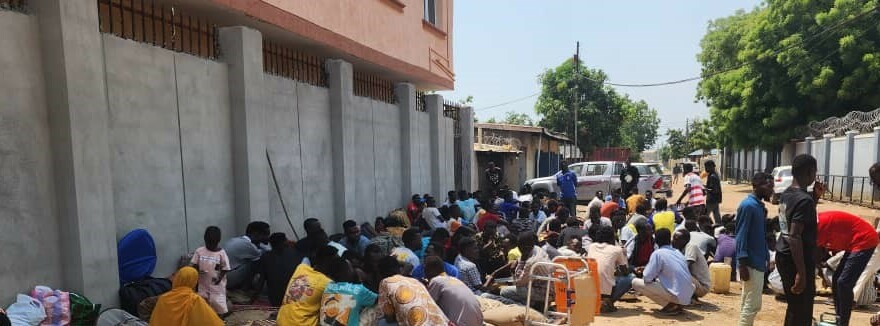Sudanese refugees in the Gorom settlement camp on the Juba-Yei road have issued an ultimatum, expressing deep concern over the lack of essential services such as food, water, and medicine.
More than 100 refugees, including women and children, gathered at the UNHCR’s head office in the capital city of Juba on Thursday to demand registration by the UNHCR and access to basic services.
Osman Adam Osman, one of the refugees at the UNHCR office in Thongpiny, described the dire situation, stating, “In Gorom, we have suffered so much. There was no food, no water, no services provided to all of us Sudanese who were there.”
Osman further highlighted the issue of security at the camp, saying, “Even the people who were supposed to give us the services of food were locked in without any reason.”
He revealed that they have been living in challenging conditions since their arrival at the refugee settlement in Gorom, especially as they were mixed with some internally displaced persons (IDPs) from the Anyak tribe of Lakes State, which led to tensions and strained relations.
Ali Muhammed Adha, another refugee, attributed the absence of basic services to the outbreak of diseases like malaria and diarrhoea. He stated, “We faced a lot of sicknesses such as malaria and heavy diarrhoea. And the cause of this diarrhea is because there is no hygiene facility for us. We are sharing hygiene facilities with the IDPs who were already there in the camp.”
Despite their plight, the refugees’ pleas seemed to have fallen on deaf ears so far, with Ali revealing that they have spent six days in Juba, yet nobody has addressed their concerns. A government official urged them to return to Gorom, but the refugees rejected the request, determined to find a solution to their hardships.
Laila Osman Hessian emphasized the specific challenges faced by women at the camp, particularly the lack of access to water points and difficulties in obtaining medical attention saying, “And when it comes to the health centre, you find that you who is number 3 will not be allowed to see the doctor but someone behind you will.”
She also highlighted the unjust treatment of men in groups who face the risk of being locked up.
In response to the refugees’ grievances, Gift Friday, the Information Officer at the UNHCR office in Juba, clarified that the responsibility of registration lies with the government of South Sudan. He explained, “The issue of registration is for the Commission for Refugees Affairs. Because this is the government’s wing that is responsible for all approval of registrations for both asylum seekers and refugees.”
However, John Dabi, deputy Commissioner for the Commission for Refugees Affairs, shifted the blame onto the refugees for leaving Gorom and coming to Juba. He pointed out that registration for refugees and asylum seekers has been transferred to Gorom due to the overwhelming population in Juba’s reception centre.
He further urged the refugees to return to Gorom for registration and emphasized that the camp is where they would receive support. Dabi highlighted the challenge of accommodating thousands of refugees daily and revealed that some complainant Sudanese refugees had not been officially registered, making it difficult to provide services.




